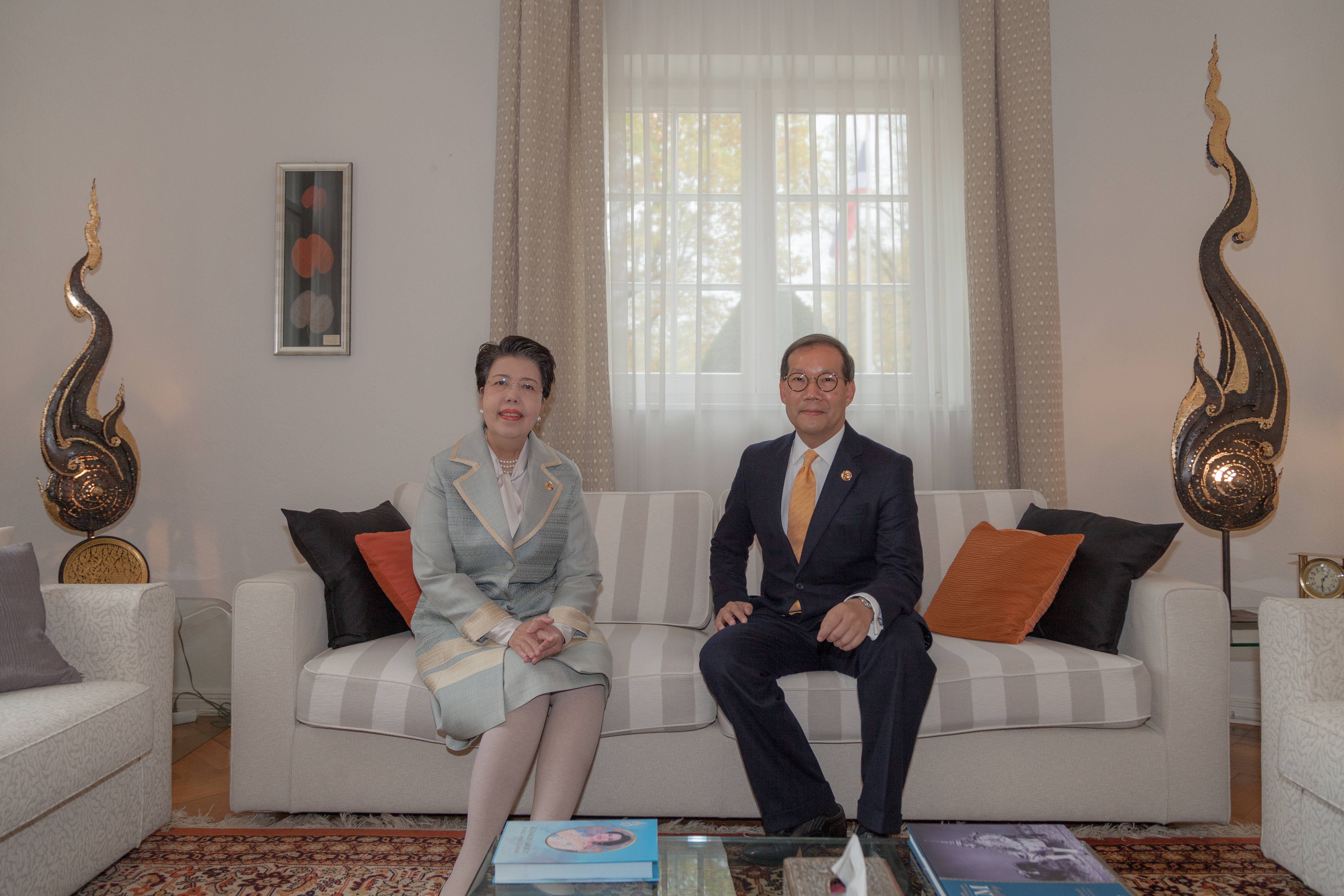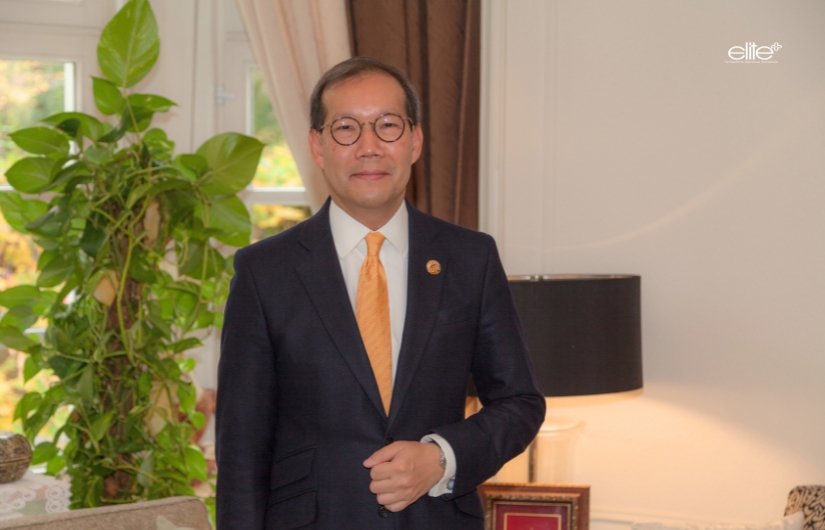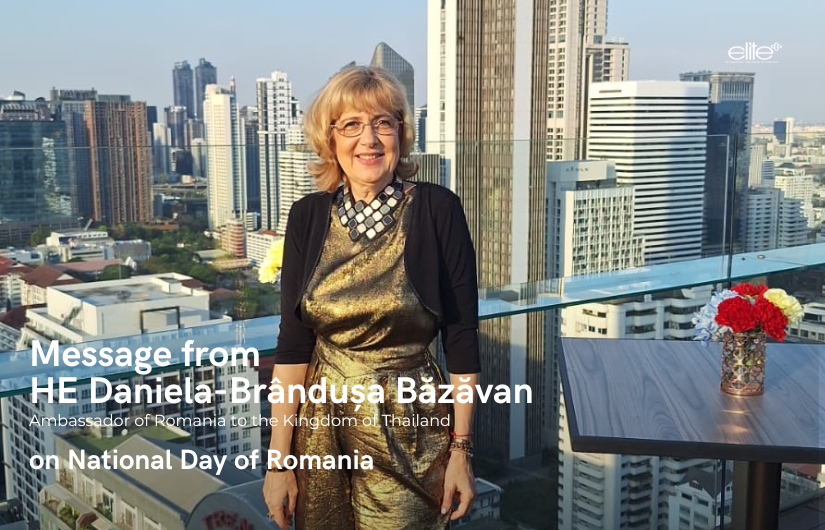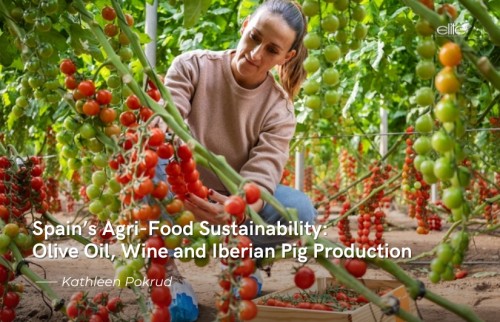A Scholarly Diplomat: HE Nattawat Kritsanamra, Thailand’s Ambassador to Germany
Recently, members of the Elite Creative Co, Ltd team participated in the world renowned Frankfurt Book Fair. While there, they had the chance to travel to Berlin and meet Thailand’s ambassador to Germany, HE Mr Nattawat Kritsanamra, who assumed his post in March of this year during which Thailand and Germany are celebrating 160 years of diplomatic relations. What follows is an edited version of their interview.
To begin, could you tell us something about yourself and your career with the Ministry of Foreign Affairs?
This year, I am completing 30 years at the Ministry of Foreign Affairs where I have served as a diplomat and scholar, as I have long been interested in history. After completing my Bachelor degree at Oxford in the UK, I sat for the Civil Service exam to apply for the Ministry. At the same time, I applied for and received a government scholarship to study for my Master’s and PhD in Switzerland. As my studies were paid for with taxpayers money, I worked hard to complete them as quickly as possible after which I returned to Thailand and spent most of my early career at the Ministry in Bangkok, beginning in the department dealing with ASEAN relations and later international organisations relations and protocol. After this I was posted to London where I served as First Secretary, or deputy chief of our mission.
Before assuming this post as the Thai ambassador to Germany earlier this year, you served at the Ministry as the Director of the Department of Protocol and later Director-General of the Department of International Organizations. Did it take much time to adjust to your new role, and how would you say these previous positions prepared you?
Both these positions helped me enormously to prepare for this ambassadorship. They provided me with many opportunities to meet and work with the ambassadors and diplomats posted in Bangkok. In fact, I even had the chance to meet and befriend the current German ambassador to Thailand, HE George Schmidt, who I have continued to cooperate with as our two countries celebrate the 160th anniversary of our diplomatic relations.
While I was the director of the Department of Protocol, I led our team that arranged for the foreign diplomatic community to attend and participate in the Royal cremation ceremonies of the late King Bumiphol Adulyadej The Great (Rama IX) and the coronation of HM King Maha Vajitalongkorn Phra Vajiraklaochaoyuhua (Rama X). This was a tremendous honour for me in itself, but also allowed me to watch and learn what is required to be an ambassador. After three years in this position, I was appointed Director-General of the Department of International Organizations, which provided me with greater insight into the operations and functions of various government and non-government entities, many of which I still work with, like the UN and EU, in my role as ambassador.

As an undergraduate student at Oxford and then scholarship recipient to study for your Master’s and PhD in Switzerland, can you tell us how this has also helped you in your professional as well as personal endeavours?
First of all, you should understand that my studies in England were privately funded, and so I did not feel the same obligations as I did as a government scholarship recipient. As I said earlier, I felt I should complete my graduate studies quickly as I was already a civil servant. This also had an influence on the subjects I chose to research.
The lifestyles and cultures of the United Kingdom and Switzerland are quite different. You must remember that the UK is very much an island nation and so has a much more defined culture. With a population of over 67 million, virtually all speak English. On the other hand, Switzerland is a small, landlocked country with a population of slightly more than 8.5 million persons. It has three official languages, German, French and Italian and a local dialect, Romansh, and nearly all also speaks English, and, thus, the country is very multicultural. Coming from the UK, Switzerland was truly an eye-opener. Set in the middle of Europe, the country offers a much more global perspective. The Swiss are also acutely aware of the environment and what needs to be done to preserve our planet. This is also true about economic and international affairs as they feel they are much more involved and dependent than I think the English do, separated on all sides by water.
Continuing on this tract, could you tell us what you and the Thai embassy are doing to promote student and academic exchange? How many Thai students are here in Germany right now, and what does the embassy do to assist them?
First of all, you should know that Thai students having been enrolling in programs in Germany since the mid-19th century. Many members of the Royal Thai family have studied here, including such notables as Prince Mahidol Na Songkhla, the son of King Chulalongkorn The Great (Rama V) and Queen Savang Vadhana.
Currently, we have over 1000 Thai students officially registered with the embassy, 60 of whom are Thai government scholars sponsored by the civil service or Ministry of Higher Education, Science, Research and Innovation. There are also many more Thais who are here in Germany taking language or other specialty short courses. Our embassy as well as our two consulates in Frankfurt and Munich provide assistance, especially when a student is feeling pressured or stressed because of the high expectations many of them face. We work hard to ensure they enjoy a full experience, which means encouraging them to get out and indulge in the local culture as well as concentrate on their studies.
At the same time, we are promoting Thai studies. The first Thai studies program in Germany dates back to 1901 when courses were first offered at Hamburg University. Today, we are still cooperating with this university as well as many others to introduce courses in both Thai and Southeast Asian studies. Recently, we participated in a symposium at Humboldt University of Berlin entitled “Sustainability of Thai Studies in Germany”. We are also helping to promote an exchange program between Heidelberg University and Buriram University. And then, I don’t know if many know that King Mongkut’s University of Technology North Bangkok was established through the support of the German government. Furthermore, they are now home to the Thai-German Graduate School of Engineering, a highly reputable institute of higher learning.
Germany is now a leader in vocational education, do you know if they have also been assisting and providing Thailand with support in this area?
Yes, Germany is certainly a pioneer in vocational education. They have developed a dual model based on collaborative partnerships between educational institutions and companies in the private sector that offer on-the-job training. Covid-19 did take its toll on these programs because of the lockdowns, but they are once again up and running. While these students don’t earn a university degree, they do earn diplomas and certificates in many applied disciplines that are required as manufacturing becomes more technologically advanced. The German chambers of commerce are also very involved in these efforts in order to have the trained workforce they need to continue to lead in the high-tech industries. There is much Thailand can learn from them to support our own industrial sectors to be internationally competitive.
Now that the Covid pandemic has ended, many Thais are looking for opportunities to work abroad. Are there opportunities available in Germany?
Healthcare does offer opportunities. First, there is a large spa sector where Thais have been finding work if they are licensed. They also don’t need to be fluent in English or German, which they do if they seek nursing or related healthcare positions. In these cases, they should study German and achieve a reasonable level of fluency to work here. It can also be somewhat difficult to get the required visa and work permit. If anyone is interested, they should contact the German embassy in Bangkok to learn what is required.
Expanding on this, how big would you say the Thai community is in Germany and how much is the Thai embassy involved?
I would say the official figure of Thais living, working and studying in Germany is 60,000, but there could be between 80,000 to 100,000, which would include Thais married to Germans and their children. We actually have the sixth largest Thai population outside of Thailand, and we only have less than Sweden within the European community.
Thais are located throughout the republic. Our embassy here in Berlin is responsible for those living in nine of the sixteen states, which is only around 20,000. Our Munich and Frankfurt consulates are then responsible for the rest, but we all work together as a team to provide Thai citizens with the services they need.
There is also a very strong network of as many as 60 Thai Buddhist temples located throughout Germany. In Berlin, itself, there are five or six, and they all serve as community centres for those living in their areas.
There are also a number of associations we are working with such as the Elderly Thai Women’s Association and the Thai Association in Berlin, which was involved in the founding of the Thai Park, a very active street food market, which is great as a soft power promoter of Thai food and culture. We are also working closely with Ban Ying, a specialised counselling centre assisting migrant workers to combat human exploitation and trafficking. Together, we are providing vocational courses such as hair cutting in Berlin and Frankfurt to give those in need the ability to earn supplementary income, particularly with the rise in food and energy costs.
Could you now tell us about the bilateral trade relations between Thailand and Germany as well as the EU?
The first treaty that was signed between our two countrie

































































































































































































































































































































































































































































































































































































































































































































































































































































































































